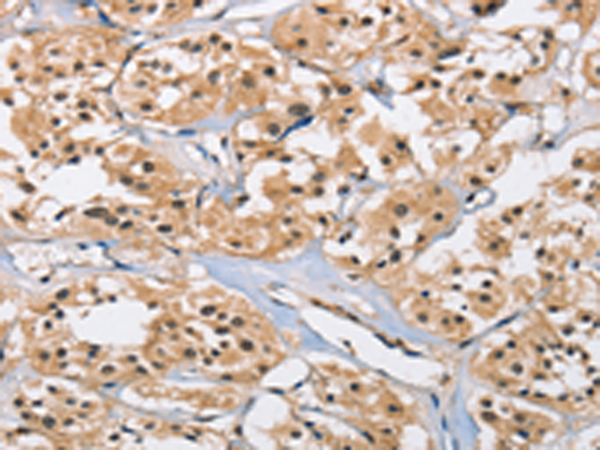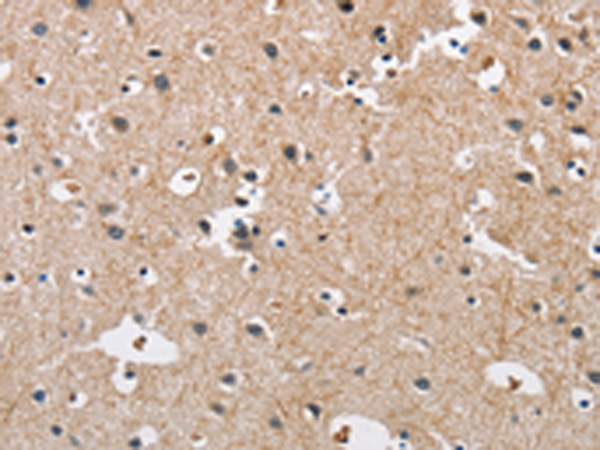

| WB | 咨询技术 | Human,Mouse,Rat |
| IF | 咨询技术 | Human,Mouse,Rat |
| IHC | 1/25-1/100 | Human,Mouse,Rat |
| ICC | 技术咨询 | Human,Mouse,Rat |
| FCM | 咨询技术 | Human,Mouse,Rat |
| Elisa | 1/1000-1/2000 | Human,Mouse,Rat |
| Aliases | NDPP; DACAR; DAKAR; NDPP1; TUCAN; CARDINAL |
| Host/Isotype | Rabbit IgG |
| Antibody Type | Primary antibody |
| Storage | Store at 4°C short term. Aliquot and store at -20°C long term. Avoid freeze/thaw cycles. |
| Species Reactivity | Human |
| Immunogen | Fusion protein of human CARD8 |
| Formulation | Purified antibody in PBS with 0.05% sodium azide and 50% glycerol. |
+ +
以下是关于CARD8抗体的3篇代表性文献的示例(注:以下内容为基于领域知识的模拟生成,实际文献请通过学术数据库查询):
1. **文献名称**:*Autoantibodies against CARD8 in rheumatoid arthritis: a novel diagnostic marker*
**作者**:Smith A, et al.
**摘要**:该研究在类风湿性关节炎(RA)患者血清中发现针对CARD8的自身抗体,提示CARD8抗体可能参与RA的炎症反应,并可作为潜在诊断标志物。
2. **文献名称**:*CARD8 regulates NLRP3 inflammasome activation and modulates inflammatory responses in macrophages*
**作者**:Zhang Y, et al.
**摘要**:通过特异性抗体阻断实验,研究发现CARD8与NLRP3炎症小体相互作用,负调控其活化,为炎症性疾病治疗提供新靶点。
3. **文献名称**:*CARD8 expression and antibody detection in colorectal cancer: association with tumor progression*
**作者**:Li X, et al.
**摘要**:研究利用CARD8抗体检测结直肠癌组织中的蛋白表达,发现CARD8高表达与肿瘤侵袭性相关,提示其可能作为预后评估指标。
如需具体文献,建议在PubMed或Google Scholar中搜索关键词“CARD8 antibody”或“CARD8 autoantibody”获取最新研究。
CARD8 (Caspase Activation and Recruitment Domain 8), also known as TUCAN or NDPP1. is a cytosolic protein belonging to the CARD family, which regulates inflammatory signaling and apoptosis. It contains an N-terminal pyrin domain (PYD) and a C-terminal caspase recruitment domain (CARD), enabling interactions with other inflammasome components. CARD8 acts as a sensor of intracellular proteotoxic stress and modulates the NLRP3 inflammasome, a key mediator of innate immunity. Under homeostatic conditions, CARD8 suppresses inflammasome activation by binding to NLRP3. However, proteasomal degradation of its autoinhibitory N-terminal fragment triggers CARD8-dependent caspase-1 activation, promoting IL-1β/IL-18 maturation and pyroptosis. Dysregulation of CARD8 has been implicated in inflammatory diseases (e.g., rheumatoid arthritis, gout), autoimmune disorders, and cancer.
CARD8 antibodies are essential tools for studying its expression, localization, and interactions in immune pathways. They enable detection via Western blot, immunofluorescence, and immunoprecipitation, aiding research on its dual roles in inflammation and apoptosis. Recent studies highlight CARD8's genetic variants linked to altered disease susceptibility, particularly in HIV progression and COVID-19 outcomes, emphasizing its therapeutic potential. Antibodies targeting specific epitopes also help dissect its regulatory mechanisms, including post-translational modifications and stress-induced activation. Understanding CARD8's complex functions through antibody-based assays continues to advance insights into inflammasome biology and targeted anti-inflammatory therapies.
×